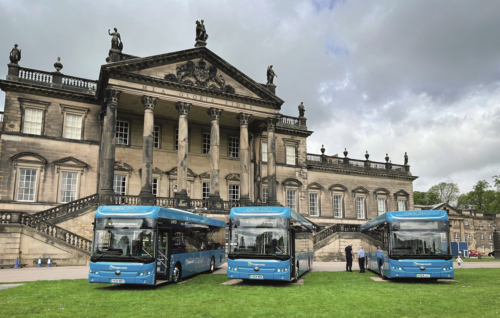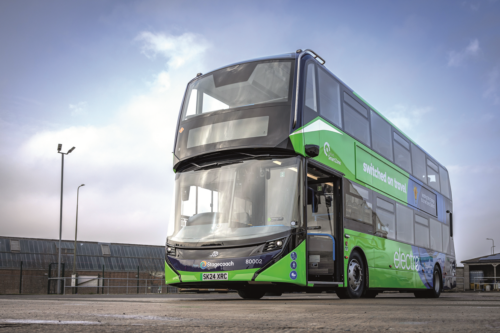
The operator has placed orders with Alexander Dennis for 244 new vehicles, and Yutong, which will supply 158
Stagecoach has announced orders for 402 new electric buses, supported by funding from the ZEBRA 2 and Levelling Up Fund. On 25 June, Alexander Dennis announced that it had received an order for 244 of its next-generation zero-emission buses, supported by numerous local authorities across England in successful bids to the second round of the UK Government’s Zero-Emission Regional Bus Areas scheme, ZEBRA 2. Stagecoach has placed a group-wide order, the largest single order for Alexander Dennis’ zero-emission buses to date, and including 180 new Enviro400EV double-deckers to join similar vehicles bought by Stagecoach with earlier ZEBRA 1 funding that are currently being delivered and commissioned for service. In addition, there will also be 54 Enviro200EV single-deckers in lengths of 10.9m and 11.7m, representing the first order for Alexander Dennis’ new integral single decker, which is expected to launch next year, plus 10 Enviro100EV 8.5m small buses.
All of the buses are expected to be delivered to Stagecoach’s operating companies in England during 2025 and 2026.
Alexander Dennis President & Managing Director Paul Davies said: “This landmark deal with Stagecoach confirms the benefits of our next-generation electric buses, which have been carefully designed to deliver a highly attractive total cost of ownership proposition.
“We are particularly delighted that Stagecoach will benefit from our platform approach to vehicle development, which maximises the number of common parts and solutions across all three vehicle types to make them easy to drive and maintain. Our Enviro100EV ‘big small bus,’ the new Enviro200EV all-rounder and the crowd-shifting Enviro400EV double-decker will be driving value together through efficiency, longevity and flexibility.”
Chief Executive Officer for Stagecoach Claire Miles said: “We’re excited to place the largest electric vehicle order to date for Alexander Dennis with these 244 new vehicles, which reflect Stagecoach’s commitment to transition to a zero-emission bus fleet. We will continue to build on our work to tackle climate change and connect communities across the UK sustainably and efficiently.”

Yutong
Stagecoach has also confirmed an order for 158 buses from Pelican Bus & Coach, following the delivery of 23 single-deckers delivered to its South Yorkshire operation. The order will mean that Stagecoach becomes the largest operator of Yutong electric vehicles in the UK, with over 200 in service.
The buses will be deployed at Stagecoach subsidiaries across England, including at its depots in Chesterfield, Slatyford, Rugby, Leamington, Nuneaton, Stockton, Preston and Sunderland. They will be jointly funded by Stagecoach and local and national government through three different funding streams: the Levelling Up Fund (Stockton), Coventry’s All-Electric Bus City programme, and ZEBRA 2.
Head of Yutong UK at Pelican Ian Downie commented: “We are absolutely delighted to receive these order awards from Stagecoach. Our vehicles have been successfully launched in Warwick, Inverness and now Sheffield and the feedback has been superb. The vehicles have state of the art air-conditioning and customer-centric features, and coupled with the reliability and performance of the tried, tested and proven Yutong product, will continue to support the Stagecoach operation.
“We have forged an excellent partnership with Stagecoach, and the total orders of an additional 158 vehicles is testament to this relationship. The vehicles are completed in our dealership at Castleford, and Pelican will support them throughout their service life.”
Stagecoach Asset Management & Infrastructure Director Tony Cockcroft commented: “Being the largest operator of Yutong electric vehicles in the UK affirms Stagecoach’s commitment to connecting communities across the UK sustainably and efficiently. Introducing these new electric vehicles brings us a step closer to realising our goal of being fully net zero and becoming more energy efficient.”
The vehicles are planned to start arriving from July, with all expected to have been delivered prior to the third quarter of 2025.

